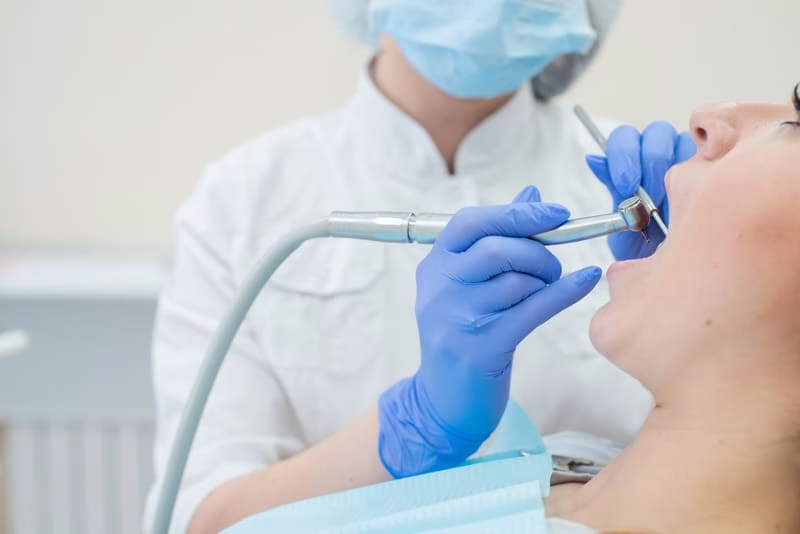
Wisdom Teeth Removal Gold Coast
Wisdom teeth, or third molars, are the last set of teeth located at the back of your mouth. These teeth usually emerge in late adolescence or early adulthood, often between the ages of 17 and 25. While some people experience no problems with their wisdom teeth, for many, they can cause discomfort, infection, or other dental issues. At MGA Dental on the Gold Coast, we specialize in wisdom teeth removal to help you achieve a healthier, more comfortable smile.
Why Do I Need to Remove My Wisdom Teeth?
Wisdom teeth removal is commonly recommended when these teeth cause one or more of the following problems:
- Impaction: When there isn’t enough space in the mouth, wisdom teeth may grow sideways, get trapped beneath the gums, or remain partially erupted. This can lead to pain, swelling, or infection.
- Infection: If the wisdom tooth partially erupts and creates a flap of gum tissue, bacteria can get trapped in this area, leading to an infection known as pericoronitis. Symptoms may include pain, swelling, and difficulty opening the mouth.
- Cavities and Decay: Wisdom teeth are located at the back of the mouth, making them difficult to clean properly. This increases the likelihood of cavities or decay. Since wisdom teeth are often hard to reach, they may go unnoticed until they cause significant problems.
- Damage to Adjacent Teeth: Impacted wisdom teeth can exert pressure on adjacent molars, potentially causing damage or shifting the alignment of your teeth. This can lead to misalignment or bite issues.
- Cyst Formation: In rare cases, cysts or tumors may form around an impacted wisdom tooth, potentially damaging the surrounding bone or teeth. Removing the wisdom teeth can prevent this from happening.

What to Expect During Wisdom Tooth Removal
At MGA Dental Gold Coast, we take great care to ensure that your wisdom teeth removal experience is as comfortable and stress-free as possible. Here’s what you can expect:
1. Consultation and Assessment: Before deciding whether wisdom teeth removal is necessary, we will conduct a thorough examination, including digital X-rays, to assess the position of your wisdom teeth. This allows us to create a personalized treatment plan tailored to your needs.
2. Anesthesia Options: Wisdom teeth removal can be performed under different types of anesthesia, depending on your preference and the complexity of the procedure. The options include:
- Local Anesthesia: Numbing the area around the tooth so that you remain awake and pain-free during the procedure.
- Sedation: Involves relaxation medications to keep you calm while under local anesthesia.
- General Anesthesia: For more complex extractions or if you’re particularly anxious, general anesthesia can be used, which will make you sleep through the entire procedure.
3. The Procedure: Once you are comfortable, the dentist will make a small incision in the gum tissue to access the tooth. In some cases, the tooth may need to be broken into smaller pieces to facilitate removal. After the tooth is extracted, the incision is closed with stitches. The entire procedure typically takes around 20 minutes to 45 minutes depending on the complexity of the extraction.
4. Post-Procedure Care: After your wisdom teeth are removed, our team will provide you with aftercare instructions to ensure a smooth recovery. This includes:
- Pain management: Over-the-counter pain medications or prescribed painkillers to help with any discomfort.
- Swelling reduction: Applying ice packs to your face can help reduce swelling.
- Oral hygiene: Instructions on how to gently clean your mouth while avoiding the extraction sites.
- Diet: A soft-food diet is recommended for the first few days to avoid irritation to the extraction sites
- Rest: Resting for 1-2 days after surgery is important to allow your body to heal.

Recovery Time After Wisdom Teeth Removal
Recovery time can vary based on the complexity of the extraction, but most patients can expect to fully recover within 1 to 2 weeks. The first few days are critical for managing pain and swelling, but after a week, the majority of patients find that their symptoms have significantly reduced. Some mild discomfort or swelling may persist for up to 1-2 weeks.
Following your aftercare instructions is crucial to ensuring a fast and successful recovery. If you notice severe pain, prolonged swelling, or signs of infection, please contact us at MGA DENTAL immediately.

How Much Does It Cost to Get Your Wisdom Teeth Removed on the Gold Coast?
The cost of wisdom teeth removal on the Gold Coast can vary depending on factors such as the complexity of the extraction, the number of teeth being removed, and whether sedation or general anesthesia is used. On average, the cost ranges from $245 to $320 per tooth for a straightforward extraction. For more complex extractions, such as impacted wisdom teeth, the cost at MGA Dental can range from $495 to $550 or more for a single tooth. The total cost may not include X-rays, consultations, and any follow-up appointments.
At MGA Dental Gold Coast, we provide detailed quotes after an initial consultation, so you’ll know exactly what to expect. We also offer flexible payment options to help make the process more affordable.

Is Wisdom Teeth Removal Covered by Medicare?
In most cases, Medicare does not cover the cost of wisdom teeth removal unless the procedure is deemed medically necessary. If your wisdom teeth are causing significant health issues, such as infection or damage to other teeth, Medicare may cover a portion of the cost, but this is determined on a case-by-case basis.
For most patients, wisdom teeth removal is considered a dental procedure, and dental insurance or private health insurance may cover part of the cost. At MGA Dental, we work with a variety of insurance providers and can assist you in understanding your coverage options.
Why Is Day 3 the Worst After Wisdom Teeth Removal?
Day 3 after wisdom teeth removal can often be the worst day for many patients due to the peak of post-operative swelling and discomfort. Here’s why:
- Swelling Peaks: On the third day, swelling typically reaches its maximum, which can cause discomfort and tenderness around the extraction site. This is a natural part of the healing process.
- Pain Intensification: As the local anesthesia wears off, you may experience an increase in pain during the first 48 to 72 hours. This can be managed with pain relievers prescribed by your dentist.
- Bruising: Some bruising may develop around the extraction site, adding to the discomfort and the sensation of being swollen.
However, after day 3, many patients start to feel relief as the inflammation begins to subside, and they experience a gradual improvement in their condition.

How Soon Can You Eat After Wisdom Teeth Removal?
After wisdom teeth removal, it’s important to allow your body time to heal. While you may feel groggy immediately after the procedure, most patients can start eating soft foods after the numbness wears off. Here are some general guidelines:
- First 24 Hours: Stick to liquid and soft foods, such as smoothies, yogurt, mashed potatoes, and soups. Avoid hot foods and drinks to prevent irritation.
- After 2-3 Days: You can begin eating more solid foods, but avoid chewing on the side of your mouth where the extraction was performed. Soft foods like scrambled eggs, pasta, and oatmeal are a good choice.
- Avoid Chewing Hard or Crunchy Foods: Until you have fully healed and any swelling or discomfort has subsided, avoid foods that require heavy chewing or are hard, such as nuts, chips, or raw vegetables.
Always follow your dentist’s advice about your eating habits during the recovery process.
What Are the Worst Things to Do After Wisdom Teeth Removal?
To ensure a smooth recovery, there are several actions you should avoid after wisdom teeth removal:
- Smoking: Smoking can disrupt the healing process and increase the risk of dry socket, a painful condition where the blood clot is dislodged from the extraction site.
- Drinking Through a Straw: The suction created by drinking through a straw can also dislodge the blood clot, leading to dry socket.
- Spicy or Hard Foods: Spicy or hard foods can irritate the wound and delay healing. Stick to soft and bland foods until you’re fully recovered.
- Excessive Physical Activity: Strenuous activities like heavy lifting or intense exercise can increase blood flow and cause excessive swelling or bleeding at the extraction site.
- Ignoring Aftercare Instructions: Not following your dentist’s aftercare instructions for cleaning, managing swelling, and taking pain medication can prolong healing or lead to complications.
- Alcohol: Drinking alcohol can interfere with the healing process and interact with pain medications.
By avoiding these activities and following your dentist’s guidance, you’ll give yourself the best chance for a smooth and quick recovery.

What Makes MGA Dental the Right Choice for Wisdom Teeth Removal?
At MGA Dental Gold Coast, we’re committed to delivering high-quality, compassionate care to every patient. We know that wisdom teeth removal can feel overwhelming, which is why we focus on making the experience as smooth and stress-free as possible.
Here’s why you should choose us:
- Expertise: Our skilled dental team has successfully performed countless wisdom tooth extractions, including complex cases, always with care and precision.
- State-of-the-Art Technology: We use the latest equipment and techniques to ensure your procedure is safe, effective, and as comfortable as possible.
- Complete Support: From your first consultation to post-treatment follow-up, we’re here to guide you through every step, making sure you feel informed and supported.
- Flexible Payment Options: We offer accessible payment plans and can assist with insurance claims where applicable, so quality care stays within reach.
Schedule Your Consultation Today
Whether you’re experiencing discomfort or need a routine removal, we’re here to ensure you receive the best care possible. If you’re concerned about your wisdom teeth or would like to schedule a consultation, contact MGA Dental Gold Coast today. Let us help you achieve optimal oral health and a confident, pain-free smile.
Frequently Asked Questions About Wisdom Teeth Removal
How do I know if I need my wisdom teeth removed?
Your dentist will assess your wisdom teeth during a routine examination or if you’re experiencing symptoms such as pain, swelling, or difficulty opening your mouth. X-rays will be taken to evaluate the positioning of your wisdom teeth and determine if removal is necessary.
Is wisdom teeth removal painful?
Most patients experience little pain during the procedure due to the use of anesthesia. After the procedure, mild discomfort, swelling, and tenderness are common but can be managed with pain relievers. Most of the discomfort subsides within a few days.
Will I need stitches after the removal?
Yes, in most cases, stitches are used to close the incision site. These stitches are often dissolvable and don’t need to be removed. You’ll receive instructions on how to care for them.
How long does it take to recover from wisdom teeth removal?
While recovery varies from person to person, most patients take about 1 to 2 weeks to fully heal. You may return to work or school within a few days, but you should avoid strenuous activity for a week.
Can I drive myself home after the procedure?
If you are receiving sedation or general anesthesia, it is not safe to drive yourself home. You should arrange for a friend or family member to accompany you.
What if I don’t remove my wisdom teeth?
Leaving problematic wisdom teeth untreated can lead to pain, infection, cavities, or damage to neighboring teeth. It can also cause crowding, misalignment, or more severe dental issues over time.